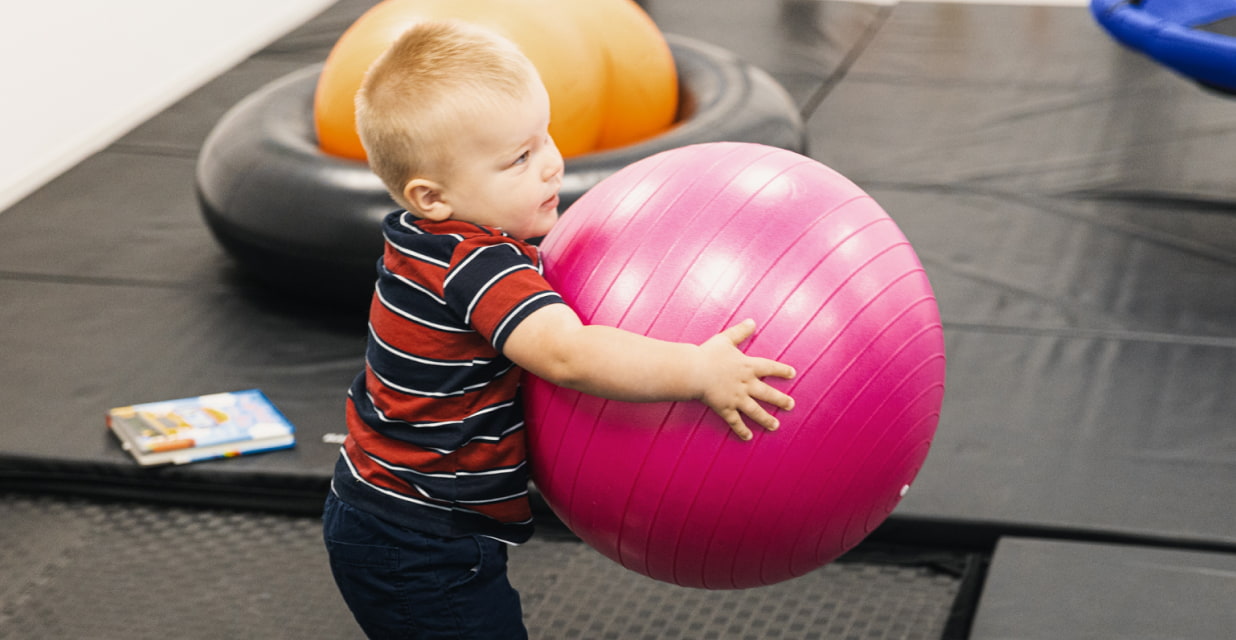
What is Occupational Therapy? Does that help my child get a job? No! “Occupations” are daily activities, so that means playing and learning for your child. Children develop daily living and self-care skills through actively exploring their environments and playing with others. Occupational therapy addresses sensory processing, motor delays, and social-emotional components that may be impacting your child’s ability to develop independence at home and school. If any of the following characteristics resonate with you, your child may benefit from occupational therapy!
Sensory Processing
- Overly sensitive or heightened reactivity to sound, touch, or movement
- Under-responsive to certain sensations (e.g., high pain tolerance, doesn’t notice cuts/bruises)
- Constantly moving, jumping, crashing, bumping
- Easily distracted by visual or auditory stimuli
- Emotionally reactive
- Difficulty coping with change
- Inability to calm self when upset
Social Interaction Skills
- Difficulty interacting socially and engaging with family and peers
- Difficulty adapting to new environments
- Delayed language skills
- Overly focused on one subject (e.g., space, universe, dinosaurs, trains)
- Can’t cope in the school environment
Play Skills
- Needs adult guidance to initiate play
- Difficulty with imitative play
- Wanders aimlessly without purposeful play
- Moves quickly from one activity to the next
- Does not explore toys appropriately
- Participates in repetitive play for hours (e.g., lining up toys)
- Does not join in with peers/siblings when playing
- Does not understand concepts of sharing and turn taking
Oral Motor/Oral Sensory
- Excessive drool
- Chews food in the front of the mouth, rather than on the molars
- Difficulty using a cup at an age-appropriate time
- Difficulty with drinking from a straw at an age-appropriate time
- Lengthy bottle or breast feedings
- Tiredness after eating
- Baby loses excessive liquid from their lips when bottle or breastfeeding
- A child loses excessive liquid or food from his or her mouth when drinking or chewing
- A child appears to be excessively picky when eating, only eating certain types or textures of food
- A child excessively mouths toys or objects beyond an age-appropriate time
Fine Motor Skills
- Manipulating toys and puzzles
- Holding a pencil
- Using silverware or straws at an age-appropriate time
- Using scissors
- Using zippers, buttons, shoelaces
- Coloring, drawing, tracing, prewriting shapes
- Poor handwriting, letter/number formation
- Not developing a hand dominance at an age-appropriate time
- Avoiding tasks and games that require fine motor skills
Gross Motor Skills
- Going up and down stairs at an age appropriate time
- Coordinating both sides of the body
- Understanding the concept of right and left
- Poor ball skills
- Poor balance
- Fear of feet leaving the ground
- Not crossing the midline of their body during play and school tasks
- Avoiding tasks and games that require gross motor skills
Visual Processing
- Difficulty with the spacing and sizes of letters
- Difficulty with recognizing letters
- Difficulty with copying shapes or letters
- Difficulty with visual tracking and crossing midline
- Difficulty finding objects among other objects
- Difficulty with copying from the board or another paper
- Difficulty with the concept of right and left
Learning Challenges
- Unable to concentrate and focus at school
- Easily distracted
- Difficulty following instructions and completing work
- Tires easily with school work
- Poor impulse control
- Hyperactivity or low energy
- Not keeping up with workload at school
- Difficulty learning new material
- Makes letter or number reversals after age seven
Do you feel like your child has difficulty in any of the areas as mentioned above? Are you questioning whether an Occupational Therapist should see your child? If so, our SmallTalk therapists are here to help strengthen these skills and answer any questions through structured and unstructured table and gym activities with weekly/bi-weekly therapy sessions. Please call to schedule an evaluation today!
Authors: SmallTalk Occupational Therapists
